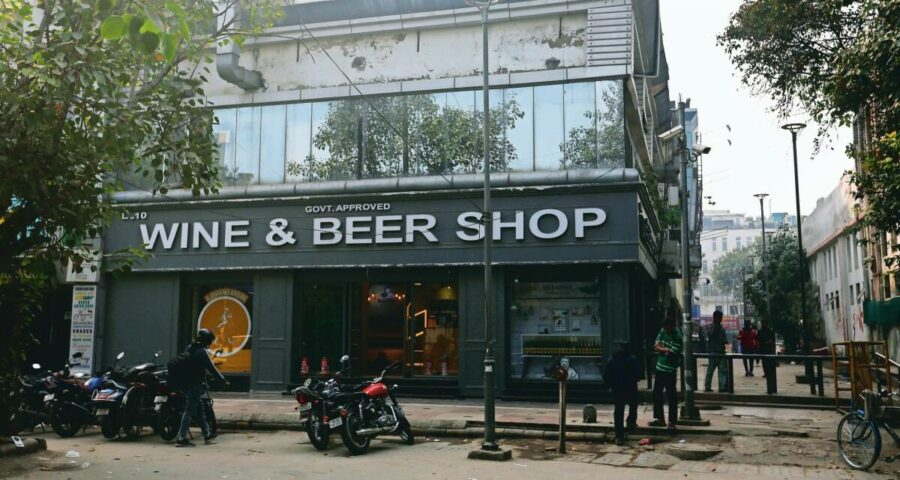As the Delhi government’s move to completely privatise the alcohol vends business begins to take shape, suppliers are running into some teething troubles. But officials are confident these are blips in a long-overdue process.
Half-empty shelves, shortage of several brands, and small protests — teething troubles seen in the first few days of implementation of the Delhi government’s new excise policy persist at the private liquor shops that have opened across the city.
Ten days ago, the new policy, which saw the government pulling out of retail trade entirely, came into force. This was preceded by a month and a half of only government liquor shops being allowed to function as bidding for new private vends was underway.
At the new liquor shop in New Friends Colony, half the shelves lie empty. On Sunday evening, a supply truck reached the store, but with only a few cartons of liquor. Only a few brands of beer and wine were available at the store, which opened on November 17.
“Wholesalers are not being able to fulfil the demand at present. Stock is low. Part of this is because people who have opened shops now are trying to order as much as they can. If, for example, they needed 50 cartons, they are ordering 200 because there is panic. Many feel they will not get enough stock in the coming days and are over ordering. This means many others are not able to procure anything,” said Sonu Kumar, the shop in-charge.

“Only a few brands are available in the market. Smaller brands of beer, for example, are available, but Kingfisher and Budweiser, for example, are not being supplied at all. We are hoping that things will improve in the coming week,” he said.
The new policy
Last year, the Delhi government had set up a committee to make suggestions for a new liquor policy. The trade, which brought in revenue of about
Rs 6,000 crore for the government, was suspected to be steeped in corruption.
In March, Deputy Chief Minister Manish Sisodia had announced that a new framework will be brought into place to change the trade and that the government will exit the business of selling liquor.
The new policy was aimed at increasing government revenue, improving consumer experience at liquor shops, and reducing corruption. Another aim was to redistribute liquor shops in an equitable way. Earlier, there were several municipal wards, where there were no authorised liquor vends and there were reports of bootlegging and illegal vends.
As per the new policy, only private liquor shops now run in the city and each municipal ward has 2-3 liquor vends. The government hopes this will stop illicit practices. Another big change was that a majority of the excise fee has been subsumed in the licence fee now. An estimated amount, based on the approximate bottles that are expected to be sold, has been charged at the time of giving licences. A small percentage will be collected based on the number of bottles sold. Sisodia had earlier told The Indian Express that since most of the money has been paid up front, there would be no incentive for corruption. After bidding, the government is expected to collect Rs 10,000 as revenue in 12 months.
Supply challenges
After reopening on November 27, private vends have faced a shortage in supply. The biggest hit seems to have been in the beer and wine selection, vendors say.
“The problem is at the supply end. Many vends are open but waiting for supply from wholesalers. Liquor shop owners usually hold a 15-day inventory. This means that if I sell alcohol worth Rs 1 lakh each day, I will have stock worth Rs 15 lakh in my inventory. Wholesalers and manufacturers usually hold on to a 10-day inventory. When the new policy came into being, this stock went empty for several days. Refilling it is the big challenge now. If we look at beer, 60% of the market is held by Kingfisher and 20% by Budweiser. None of these are available. Some smaller brands are available, but even among those, there is no light beer in the market. The position is the same for wines,” said a liquor trader who has been in the business for decades.
For many traders, ordering alcohol from wholesalers is proving to be a challenge. At Star City Mall in Mayur Vihar, trader Amit Bhadana has a long line of customers at his store, but shelves in his shop are only half full.
“The website through which we have to place orders has been slow for a long time. Several people are struggling to place orders. Those who have managed to get through have placed large orders anticipating a shortage in future so there is not enough left for those who cannot place orders on time. Customers are back, but variety is missing in shops,” he said.
The government believes the challenges in supply should be resolved in the coming two weeks.
“There have been some problems with the backend, but things are smoothening out slowly. The entire system is new and there have been a few initial hiccups. We are expecting the supply chain to improve in two weeks. There are just teething troubles,” an excise department official said.
Meanwhile, in some places, residents and political parties have protested against the opening of new vends.
While the number of liquor vends has remained the same as earlier, because of redistribution and retendering, liquor shops have now opened in new areas.
In Jangpura A, residents have gone to court demanding that the new vend not be allowed to function. On Sunday, 7-8 residents sat outside the shop holding placards and demanding that it be shut down and shifted to another area.
“There is a temple, a gurdwara, a church and a masjid close to where the shop is coming up. There is even a school and an ashram nearby. The road is narrow and there will be regular traffic jams here. How can a liquor shop be opened here? We filed a PIL in court that will be heard on December 3,” said the group of residents sitting outside the shop.
In the shop inside, the manager says they had to send back the stock that they had bought because of the protests. “We will get a final answer only on December 3 now,” he said.
Delhi government officials said that the protests were politically motivated. “Both BJP and Congress want to bring this issue up to get some support in the MCD polls. We made it clear that the number of vends has not increased, only redistribution has taken place. Things should smoothen out in the coming few weeks,” said a senior official.
Source: Read Full Article


